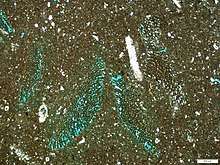Floatstone
The original Dunham classification (Dunham, 1962[1]) of limestones did not consider the separate classification of coarse grained carbonate lithologies. In an attempt to rectify this, Embry & Klovan (1971[2]) introduced the terms rudstone (grain supported) and floatstone (matrix supported) for coarse-grained allochthonous limestones. This definition of a floatstone was most recently clarified as "a carbonate-dominated rock where more than 10% of the volume is grains larger than 2 mm and the fabric is supported by the component that is 2 mm and smaller".[3]

Thin section photomicrograph of Orbitolinid foraminifera floatstone with a fragmented bioclast packstone matrix, plane polarised light

A Floatstone: few, but relatively large components in micritic matrix (width of picture is 20 mm)
Floatstone is a type of carbonate rock.
References
- Dunham, R.J. (1962) Classification of carbonate rocks according to depositional texture. In: Classification of Carbonate Rocks (Ed. W.E. Ham), Am. Assoc. Pet. Geol. Mem., 1, 108–121.
- Embry, A.F. and Klovan, J.E. (1971) A Late Devonian reef tract on Northeastern Banks Island, NWT. Bull. Can. Pet. Geol., 19, 730–781.
- Lokier, Stephen W.; Al Junaibi, Mariam (2016-12-01). "The petrographic description of carbonate facies: are we all speaking the same language?". Sedimentology. 63 (7): 1843–1885. doi:10.1111/sed.12293. ISSN 1365-3091.
This article is issued from Wikipedia. The text is licensed under Creative Commons - Attribution - Sharealike. Additional terms may apply for the media files.